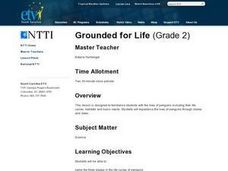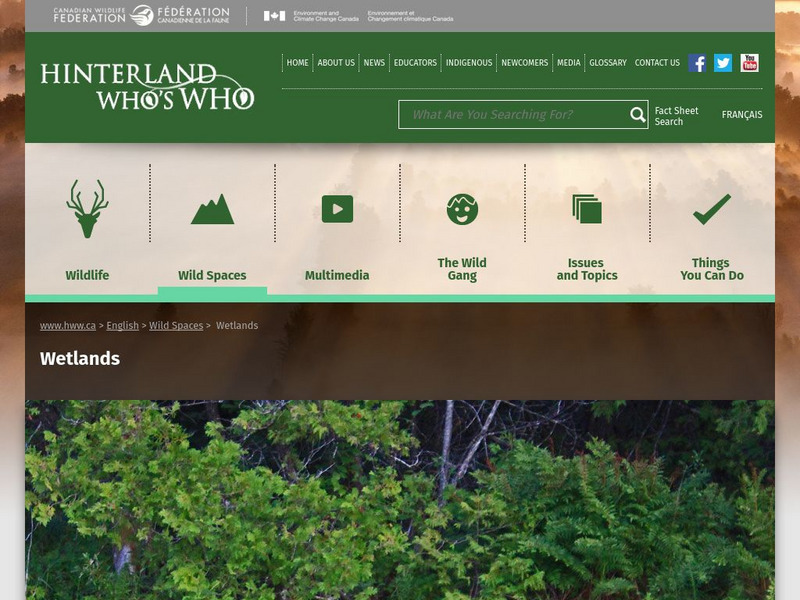Curated OER
Land Use
Students examine ecosystems that covered Illinois 200 years ago, investigate some living and non-living components of ecosystems, identify components of prairie system, create food webs, and observe human effects on environment. Lessons...
Curated OER
Environmental Science/Water Pollution
Learners study natural habitats, aquatic life, renewable and non-renewable resources. They discuss conservation efforts for sea otters and desert toad in this units.
Curated OER
Meadow Study
Middle schoolers examine insects they collect in a sweep nets. They identify as many of the insects as they can.
Curated OER
Junior Engineering Surface Water
Students experience the effects of pollution and erosion on a model of a watershed and explore ways to change the outcome.
Curated OER
Seeing a World of Difference
Students read through the lyrics and listen to a song about biodiversity. Using pictures they draw, they interpret the song according to their prior knowledge. They identify the threats to different regions around the world and create...
Curated OER
Endangered Species- Florida Panther
Students investigate the concept of the conservation of the Florida Panther and examine the effects of the Everglades water restoration project. They conduct a web based activity that includes the following: Listing what they know,...
Curated OER
Hide & Seek Butterflies
Students examine a variety of butterflies and discuss how they believe they get their color variations. In groups, they brainstorm the advantages and disadvantages of their color schemes. To end the lesson, they watch butterflies in...
Curated OER
Adaptable Mandibles
Young scholars define adaptation and highlight example of adaptation in birds and other animals. They study feeding techniques of seabirds and investigate the effect that trash has on wildlife.
Curated OER
Alligator
Middle schoolers create a model of an alligator out of clay using both artwork and research to guide their finished work.
Curated OER
Scavenger Hunt
Pupils research water quality issues and the impact on the environment using the Internet.
Curated OER
Understanding Estuaries
Students work together to develop their own estuarine ecosystem in an aquarium. They observe the aquarium daily and record them in a notebook. They discuss the different interactions they see with the class.
Curated OER
Make Way for Wild Migrants
Young scholars discuss the threats facing migratory species and track the seasonal journeys of wildlife in real space and in cyberspace. Once they have gathered information from several sources, they create a portfolio to share with...
Curated OER
Grounded for Life
Second graders become familiar with the lives of penguins including their life cycles, habitats and basic needs. Students will experience the lives of penguins through stories and video.
Curated OER
Ecology
Middle schoolers examine the relationship between the environment and those that have to live in it. They discover that we are responsible for our environment and understand the consequences of its neglect.
Curated OER
Investigating Animals in Water
Students observe small animal activity. They identify local water animals and describe the habitats where water animals can be found. Students collect samples to observe in the classroom.
Defenders of Wildlife
Defenders of Wildlife: Wetlands Habitat
Wetlands are critical to the survival of many species of wildlife and plants. While this site describes American wetlands, many of the features are the same as Canadian ones. The Canada goose depends on the survival of some American...
University of Guelph
What Are Wetlands?
Wetlands are an important part of our ecosystem. They are often called the kidneys of the land. Learn about wetlands, where they are located, their value, and what threatens them.
Canadian Wildlife Federation
Hinterland Who's Who: Wetlands
Learn about Canada?s wetlands, what they are and where they are located. Wetlands are divided into two classes: freshwater and saltwater. They are further separated into four main types: ponds, marshes, swamps, and peatbogs. Discover the...
American Institute of Biological Sciences
Action Bioscience: Loss of Wetlands: How Bird Communities Are Affected
With increased deforestation, invasive species, and other human actions harming or eliminating the wetland habitats the bird populations are decreasing. Scientists are working diligently to restore the wetland birds' habitats.
Other
San Francisco Bay Area Wetlands Restoration Program
Homepage for the massive wetlands restoration project in San Francisco Bay. History, objectives, and benefits of the project are described.
A-Z Animals
A Z Animals: Reference: Habitats: Swamps and Wetlands
Learn about the plants, animals, and other characteristics of some wetland ecosystems.
Environmental Education for Kids
Eek!: Habitats: Wetlands
Wetland ecosystems are extremely valuable to wildlife, supporting a greater number of animals than any other type of habitat. Wetlands also absorb flood waters; filter chemicals, sediments, and other impurities out of drinking water;...
Other
Galveston Bay Estuary Program: Habitat Restoration and Preservation
Describes the projects that have been undertaken in the Galveston Bay estuary region of Texas to restore and protect shoreline and wetlands habitats.






















